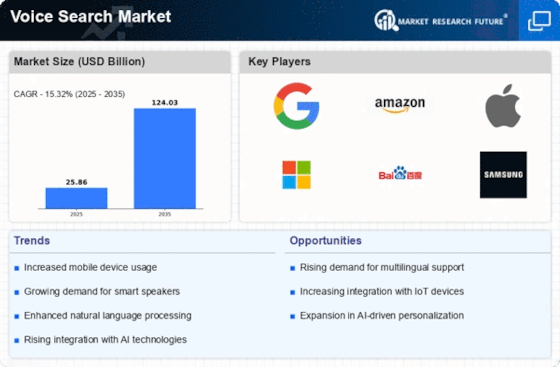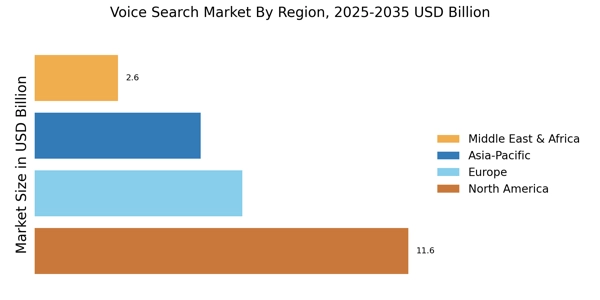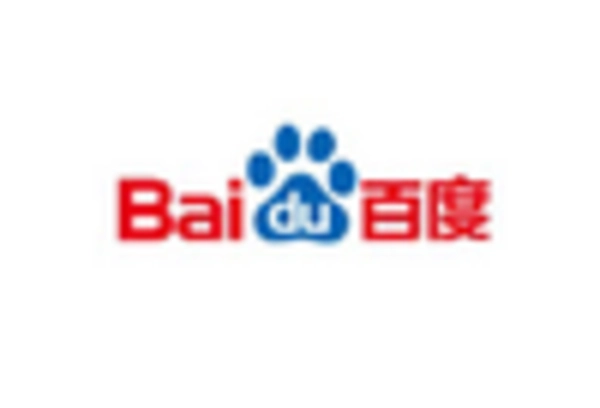Increasing Mobile Device Usage
The proliferation of mobile devices has catalyzed the Voice Search Market, as users increasingly rely on smartphones for everyday tasks. In 2025, it is estimated that over 80% of internet users will own a smartphone, facilitating the integration of voice search capabilities. This trend indicates a shift in consumer behavior, where voice commands are preferred for convenience and speed. As mobile applications enhance their voice search functionalities, the industry is likely to witness a surge in user engagement. Furthermore, the convenience of hands-free operation aligns with the fast-paced lifestyle of modern consumers, suggesting that the Voice Search Market will continue to expand as mobile device usage rises.
Expansion of Smart Home Technologies
The expansion of smart home technologies is significantly impacting the Voice Search Market. As more households adopt smart devices, the demand for voice-activated controls is on the rise. In 2025, it is estimated that the smart home market will reach a valuation of over 150 billion dollars, with voice search functionalities playing a crucial role in user interaction. Consumers are increasingly seeking convenience and automation in their homes, leading to a greater reliance on voice commands for managing devices. This trend not only enhances user experience but also drives the growth of the Voice Search Market, as manufacturers integrate voice search capabilities into their products.
Advancements in Artificial Intelligence
The Voice Search Market is significantly influenced by advancements in artificial intelligence (AI) and machine learning technologies. These innovations enhance the accuracy and efficiency of voice recognition systems, making them more user-friendly. In 2025, it is anticipated that AI-driven voice search will account for a substantial portion of all search queries, as users seek more intuitive interactions with technology. The ability of AI to understand context and nuances in human speech is likely to improve user satisfaction and drive adoption rates. Consequently, the Voice Search Market stands to benefit from ongoing AI developments, which may lead to more sophisticated voice search applications.
Integration of Voice Search in E-commerce
The Voice Search Market is experiencing a notable transformation due to the integration of voice search technologies in e-commerce platforms. As of 2025, it is projected that nearly 30% of online shopping will be conducted through voice-activated devices. This shift is driven by the desire for seamless shopping experiences, where consumers can place orders and find products using voice commands. Retailers are increasingly adopting voice search to enhance customer engagement and streamline the purchasing process. The convenience of voice search not only improves user experience but also potentially increases conversion rates, indicating a promising future for the Voice Search Market in the e-commerce sector.
Growing Demand for Voice-Activated Assistants
The rising demand for voice-activated assistants is a pivotal driver of the Voice Search Market. As consumers become more accustomed to using virtual assistants like Siri, Alexa, and Google Assistant, the expectation for voice search capabilities in various applications increases. By 2025, it is projected that the number of households using voice-activated devices will surpass 50%, indicating a shift in how individuals interact with technology. This trend suggests that businesses must adapt to meet consumer expectations, thereby propelling the Voice Search Market forward. The integration of voice search into daily routines is likely to become a standard practice, further solidifying its relevance.

















